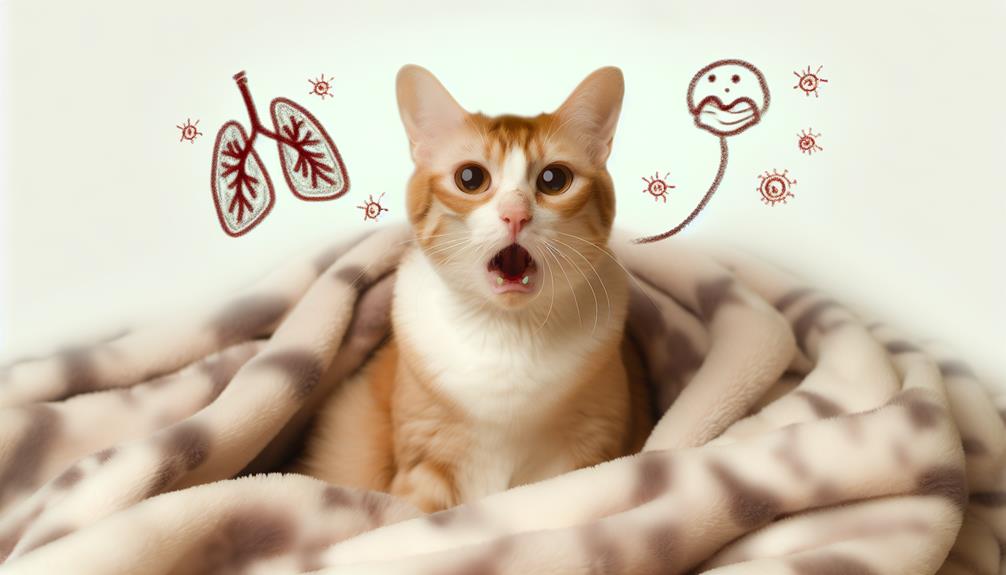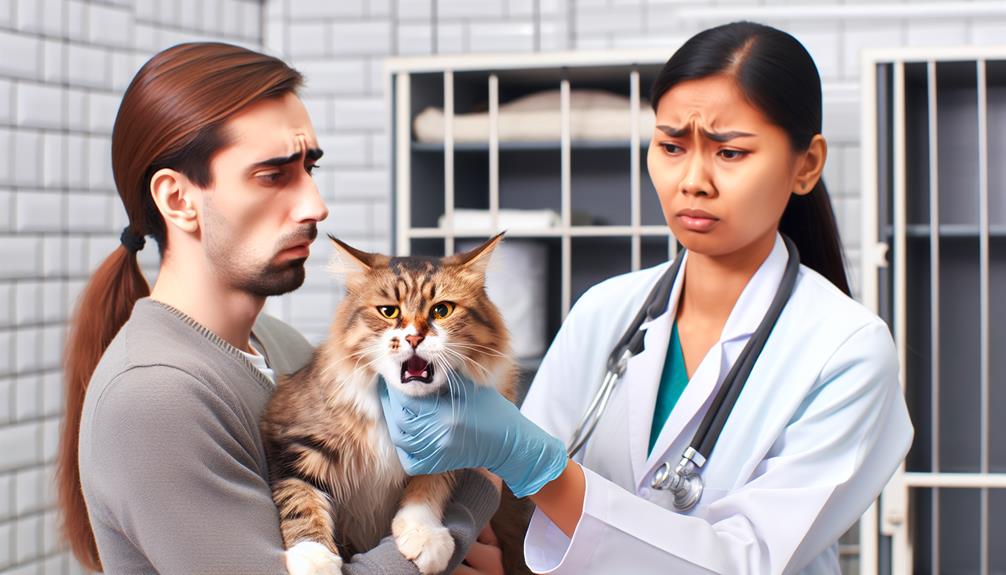If your cat's been coughing, it might leave you wondering about the underlying cause. Coughing in cats can stem from a variety of issues, ranging from something as simple as hairballs to more serious health conditions like respiratory infections or asthma. You might even notice your cat reacting to common allergens such as dust or pollen. It's essential to pay attention to the frequency and any accompanying symptoms since these details can guide you in seeking the right care. But what should you really look out for, and when is it time to consult a vet?
Common Causes
When your cat starts coughing, it can be concerning, but understanding the common causes can help you identify potential issues. One frequent cause of coughing in cats is hairballs. Cats groom themselves regularly, and during this process, they ingest loose hair. Most of this hair passes through their digestive system without problems, but some can accumulate in the stomach and form hairballs. When your cat tries to expel a hairball, it can lead to coughing, which is often accompanied by retching or gagging sounds.
Foreign objects are another potential cause of coughing. Cats are naturally curious creatures and might accidentally inhale or ingest small items. These foreign objects can get lodged in the throat or airways, causing irritation and leading to coughing. If you suspect your cat has swallowed something it shouldn't have, it's vital to seek veterinary attention promptly to prevent further complications.
Additionally, respiratory infections can cause coughing. While these are typically viral or bacterial, they can lead to symptoms such as coughing, sneezing, and nasal discharge. If your cat's coughing is persistent and accompanied by other signs of illness, a visit to the veterinarian is warranted for a proper diagnosis and treatment plan.
Understanding these common causes—hairballs, foreign objects, and respiratory infections—can help you better assess your cat's condition. Monitoring the frequency and severity of your cat's cough, along with any additional symptoms, is essential in determining whether veterinary intervention is necessary. Always prioritize your cat's health by seeking professional advice when in doubt.
Allergies and Irritants
Have you ever considered that your cat's coughing might be due to allergies or environmental irritants? Just like humans, cats can suffer from allergies, and these environmental factors can greatly impact their respiratory health. One common cause of feline coughing is exposure to allergens, which can be particularly prevalent during seasonal changes.
Environmental factors play an important role in your cat's health. Allergens such as pollen, mold, dust mites, and certain household chemicals can trigger an allergic reaction, leading to coughing and other respiratory symptoms. It's vital to identify and mitigate these triggers to provide relief for your furry friend.
Common allergens and irritants include:
- Pollen: During certain times of the year, particularly spring and fall, pollen levels can spike, causing your cat to experience allergic reactions.
- Dust mites: These tiny creatures thrive in household dust and can be a major source of irritation for your cat.
- Mold: Damp environments can promote mold growth, which can be highly irritating to your cat's respiratory system.
- Household chemicals: Cleaning products, air fresheners, or even certain types of cat litter can release fumes or particles that cause your cat to cough.
Seasonal changes can exacerbate these issues as different allergens become more prevalent at different times of the year. Keeping your home clean and well-ventilated can help reduce exposure to these irritants. Additionally, consider using hypoallergenic bedding and air purifiers to further improve the air quality in your home.
Respiratory Infections

Although allergies and irritants are common culprits, respiratory infections can also be a significant cause of your cat's coughing. These infections can be either viral or bacterial, and they often lead to symptoms like coughing, sneezing, nasal discharge, and lethargy. Understanding the underlying cause is vital for effective treatment and ensuring your cat's well-being.
Viral infections, such as feline herpesvirus and calicivirus, are common in cats. These infections are highly contagious and can spread rapidly, especially in multi-cat households or shelters. Symptoms can range from mild to severe and often include ocular discharge, fever, and coughing. While there is no cure for viral infections, supportive care and antiviral medications can help manage the symptoms.
Bacterial infections, on the other hand, can develop secondary to viral infections or as primary infections. Bordetella bronchiseptica and Chlamydophila felis are two common bacterial pathogens that affect cats. These bacterial infections often present with similar symptoms to viral infections but can also include difficulty breathing and a more pronounced cough. Antibiotics are typically prescribed to treat bacterial infections, but it is important to complete the full course to prevent recurrence.
Here's a quick comparison to better understand the emotional and clinical implications:
| Infection Type | Symptoms |
|---|---|
| Viral Infections | Sneezing, coughing, fever |
| Bacterial Infections | Pronounced cough, difficulty breathing |
| Treatment (Viral) | Supportive care, antivirals |
| Treatment (Bacterial) | Antibiotics |
Asthma in Cats
Asthma in cats, while not as commonly discussed as other feline health issues, can greatly impact your pet's quality of life. Feline asthma is a chronic inflammatory disease of the airways, causing symptoms like coughing, wheezing, and labored breathing. Imagine your cat struggling to breathe, each cough a reminder of their ongoing discomfort. It's distressing to witness and even more so for your beloved pet to endure.
Feline asthma occurs when the airways become inflamed and narrow, often due to allergens or stress. Common triggers include pollen, dust, cigarette smoke, and even certain types of litter. Recognizing the symptoms early and understanding the triggers can be essential in managing this condition effectively.
Emotional Triggers
- Watching your cat gasp for air.
- Hearing their persistent, hacking cough.
- Seeing them struggle to do simple activities.
- Feeling helpless as they experience an asthma attack.
Treatment options for feline asthma typically include medications to reduce inflammation and open up the airways. Corticosteroids are commonly prescribed to decrease airway inflammation, while bronchodilators help to widen the airways, making it easier for your cat to breathe. In some cases, a combination of these medications is necessary.
Inhalers specifically designed for cats can also be used, allowing for direct delivery of medication to the lungs. Additionally, managing your cat's environment by reducing exposure to known allergens can notably improve their condition. Keeping your home smoke-free, using hypoallergenic litter, and regularly cleaning to minimize dust can all make a substantial difference.
When to See a Vet

It's important to recognize when your cat's coughing warrants a visit to the vet. While occasional coughing might not be a cause for immediate concern, persistent or severe coughing can indicate underlying health issues that require professional attention. Monitoring the coughing duration is vital; if your cat's cough persists for more than a few days or seems to worsen, it's time to schedule an appointment with your veterinarian.
Pay close attention to your cat's behavior alongside the coughing episodes. Behavioral changes such as lethargy, decreased appetite, or difficulty breathing are red flags. If your cat appears distressed, struggles to catch its breath, or exhibits wheezing, these symptoms may signal serious conditions like respiratory infections, asthma, or heart disease. It's important not to delay seeking veterinary care in these cases, as prompt diagnosis and treatment can greatly improve your cat's prognosis.
Additionally, observe any accompanying symptoms that might suggest an emergency. For instance, if your cat is coughing up blood, has a blue-tinged tongue or gums, or collapses, these are critical signs that require immediate veterinary intervention. Even if the coughing seems mild but is accompanied by unusual behaviors, it's better to err on the side of caution.
Don't attempt to self-diagnose or treat your cat's cough without veterinary guidance. Cats can be sensitive to medications, and improper treatment could exacerbate the issue. By keeping an eye on the coughing duration and your cat's behavior, you can make sure that your feline friend receives the appropriate medical care when needed.
Conclusion
If your cat's coughing persists, it's essential to seek veterinary advice. For instance, imagine your cat, Luna, coughing frequently due to a respiratory infection. After a vet visit, Luna was diagnosed with feline herpesvirus and prescribed medication, which greatly improved her condition. Monitoring symptoms and getting timely veterinary care can make a world of difference. Don't ignore persistent coughing; acting promptly can guarantee your cat stays healthy and happy.
